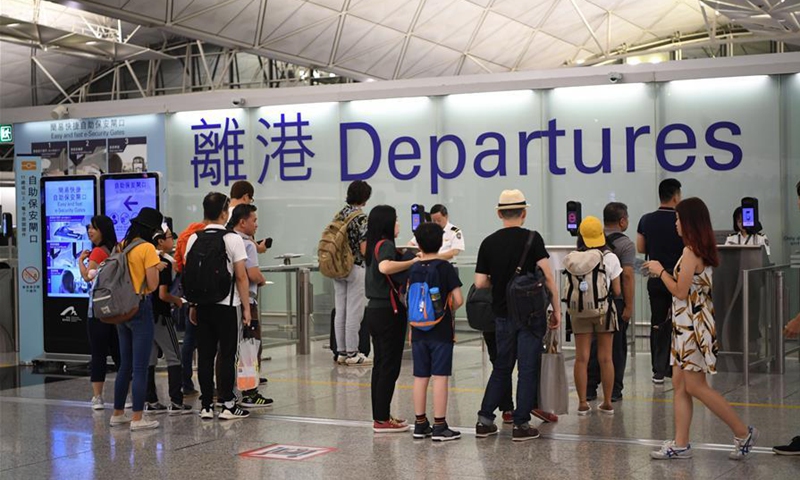Harboring illegal separatists may add obstacles to China-UK ties: ambassador
By Zhao Yusha and Deng Xiaoci Source: Global Times Published: 2020/8/17 21:49:15

Photo taken on Aug. 15, 2019 shows travellers at Hong Kong International Airport in Hong Kong, south China. Photo: Xinhua
Hong Kong secessionists fleeing to the UK and promoting the "parliament in exile" severely breach and blatantly defy Article 29 of the national security law for Hong Kong, warned legal experts, who said that those people, along with UK organizations or individuals who sponsored them, will face legal punishment no matter their whereabouts and face severe sanctions from China.
China's ambassador to the UK also warned that harboring a so-called "parliament" in the UK will set new severe obstacles to bilateral ties.
Hong Kong separatist Sunny Cheung is thought to have become the latest figure to flee to the UK and seek refuge with high-profile Hong Kong secessionist Nathan Law Kwun-chung, after the national security law was officially implemented in the Hong Kong Special Administrative Region (HKSAR), media reported.
Cheung fled Hong Kong before the police formally charged him. Reports said he is likely to join Law, and build the "parliament in exile" together with Simon Cheng, a former employee of the British Consulate-General in Hong Kong.
It would be wrong if the UK permits the establishment of this so-called "parliament in exile," and this will create a new and serious obstacle to China-UK ties. Such an organization would be an anti-China organization aimed at undermining "one country, two systems," dividing China and promoting "Hong Kong independence," Liu Xiaoming, Chinese Ambassador to the UK, said on Friday in an exclusive interview with the Global Times.
If this were allowed, the UK would be in serious violation of the basic norms governing international relations - that is to say, respect for other countries' sovereignty and territorial integrity, Liu said.
British media reported that Law and Cheng are both in the UK, and are planning to use London as a base for the opposition forces from Hong Kong.
During his stay in the UK, Law has colluded with China hawk UK politician Luke de Pulford who launched an investigation into British senior police officers in the Hong Kong force.
Joshua Wong, another secessionist, recently urged Law on social media to doxx a Hong Kong police officer and his family members, who are reportedly living in the UK. The police officer shot and injured a rioter after the latter tried to snatch his gun in November 2019.
Exiled Hong Kong activists in the UK should be aware that establishing such a council directly violates the newly enacted national security law for Hong Kong, as provided in Article 29 of the law, no matter their whereabouts, said Tian Feilong, a legal expert on Hong Kong affairs at Beihang University in Beijing.
Article 29 states that a person who conspires with a foreign country or an institution, organization or individual outside the mainland, Hong Kong and Macao, shall be guilty of an offense.
"No matter where they are, be they in Hong Kong or outside of it, the mainland and SAR governments have the right to punish them," Tian said. He added that if any UK politician or organization is found sponsoring illegal activities of those secessionists, they should also be punished and face sanctions from China.
Ties between China and the UK have soured since the latter interfered in Hong Kong-related issues, including a change in the policy for British National Overseas (BNO) passport holders, and indefinitely suspending the extradition treaty with Hong Kong.
On the UK's provocation, Liu said in the exclusive interview with the Global Times that China will consider refusing recognition of BNO passports as a valid travel document, and reserves the right to take further countermeasures.
Liu made it clear that the UK's change in the BNO status is political manipulation, and its real intention is to interfere in Hong Kong affairs and disrupt the implementation of the national security law for Hong Kong.
Tian said that China could also ask Hong Kong residents to choose between Hong Kong residency and BNO, and to further devalue the BNO's appeal, as a countermeasure to the UK's move.
Posted in: HK/MACAO/TAIWAN